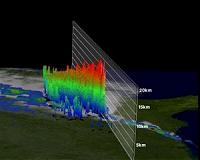| . |  |
. |
for The Hot Zone Moffett Field CA (SPX) May 11, 2011 Surfers, kiteboarders, and other ocean joy-riders might be pleased with this latest bit of news. Wind speeds and wave heights have been increasing over the past quarter century, a result possibly linked to warmer waters caused by climate change. A study published last week in the journal Science states that wind speeds over the majority of the world's oceans have increased by at least 0.25 percent to 0.5 percent per year, a cumulative increase of 5 to 10 percent over the last 20 years. That's quite a bit of lift. Meanwhile, waves have jumped in height, but less significantly. The overall pattern is a higher growth in big, big waves, which makes sense since these kinds of waves tend to be generated by storms. Bigger storms, like hurricanes and cyclones, could be related to the ocean patterns and are long suspected to be on the rise because of climate change. But the authors, led by Ian Young at the Australian National University in Canberra, warn against preliminarily linking the results to climate change. Decadal variations in wind belts have been observed as have periodic changes in wave heights, making it difficult to know whether the results are at the top end of a oscillation or a steadily increasing trend. "Only a longer data set will be able to separate these possibilities," the authors write. Russian heat wave in 2010 not caused by climate change Last summer Russia suffered a debilitating heat wave, its hottest since 1880, making Russian officials for the first time into advocates for stemming climate change (Russia doesn't have a great reputation on the topic). But alas, as much as it would help the climate change cause to link yet another heat wave to global temperature rise, a new study says that Russia experienced a fluke unrelated to the trend last year that made 2010 the hottest on record. Proving that not wacky weather event is climate change related, the study out of NOAA and the University of Colorado at Boulder found that natural variability produced the 62-day mercury spike that killed 11,000 people in Moscow, scorched 300,000 acres, and destroyed 1,500 homes. By using simulation modeling, the researchers found that the heat wave was the result of abnormal atmospheric patterns caused by displaced subtropical air that was blocked as it descended and then amplified because of reduced cloud cover and drought. If this had been climate related, there should have been a pattern of these kinds of events increasing in Russia over time, the researchers say. But there's been no significant warming trend over the last century and a half, nor any indication of a trend towards increasing warm weather extremes. They write that "no statistically significant long-term change is detected in either the mean or variability of western Russia July temperatures, implying that for this region an anthropogenic climate change signal has yet to emerge above the natural background variability." That's not what happened in 2003 in Western Europe, an event that's been well tied to climate change.
Share This Article With Planet Earth
Related Links The Hot Zone Weather News at TerraDaily.com
 TRMM Satellite sees massive thunderstorms in severe weather system
TRMM Satellite sees massive thunderstorms in severe weather systemGreenbelt MD (SPX) May 02, 2011 The Tropical Rainfall Measuring Mission or TRMM satellite again flew over severe thunderstorms that were spawning tornadoes over the eastern United States on April 28 and detected massive thunderstorms and very heavy rainfall. TRMM, a satellite managed by both NASA and the Japanese Space Agency, captured the rainfall rates occurring in the line of thunderstorms associated with a powerful c ... read more |
|
| The content herein, unless otherwise known to be public domain, are Copyright 1995-2010 - SpaceDaily. AFP and UPI Wire Stories are copyright Agence France-Presse and United Press International. ESA Portal Reports are copyright European Space Agency. All NASA sourced material is public domain. Additional copyrights may apply in whole or part to other bona fide parties. Advertising does not imply endorsement,agreement or approval of any opinions, statements or information provided by SpaceDaily on any Web page published or hosted by SpaceDaily. Privacy Statement |